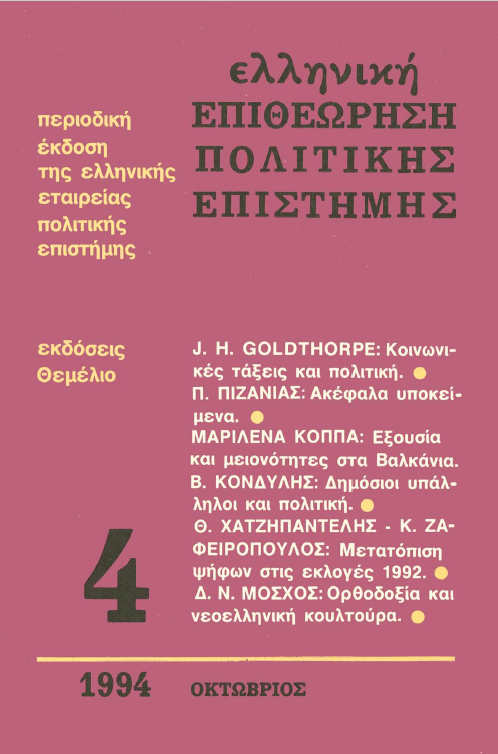Headless subjects: A voyage through political structure guided by subjectivity

Abstract
The fundamental causes of the current crisis of the Greek political system are traced to the relations between social actors, government, political parties, and the state. The article undertakes an analysis of these relationships in the light of both their historical development and their current dynamics. The social and political practices of collective subjects linked to each of these four actors serve as the criteria for determining the nature of the malfunctions characteristic of the Greek political system.
To the extent that all the central institutions of the Greek political system become involved in this crisis, the latter appears to lack an identifiable epicenter. The outcome of this development is the devaluation of politics and its substitution by the attempts of the political parties to satisfy numerous and sharply contradictory, particularistic desires expressed by a heterogeneous mosaic of professional and other groups in Greek society. In the process, the relation between the state and social actors becomes privatized and results in a diffusion of anomie.
The combined outcome of the crisis of its various manifestations is an exacerbation of social inequality in Greece. This is especially the case to the extent that the notion «might is right» becomes the single operative principle of the Greek social formation. The attempt to satisfy the totality of expressed desires in terms of a particularist logic only serves to intensify inequalities. The resulting vicious circle not only adversely affects social dynamics but, in addition, contributes to the elimination of institutional differentiation and to a leveling process which virtually negates the social content of the concept of equality.
Article Details
- How to Cite
-
Πιζάνιας Π. (2017). Headless subjects: A voyage through political structure guided by subjectivity. Greek Political Science Review, 4(2), 25–57. https://doi.org/10.12681/hpsa.15295
- Issue
- Vol. 4 (1994)
- Section
- Articles

This work is licensed under a Creative Commons Attribution-NonCommercial-ShareAlike 4.0 International License.
Authors who publish with this journal agree to the following terms:
Authors retain copyright and grant the journal right of first publication with the work simultaneously licensed under a Creative Commons Attribution licence that allows others to share the work with an acknowledgement of the work's authorship and initial publication in this journal.
Authors are able to enter into separate, additional contractual arrangements for the non-exclusive distribution of the journal's published version of the work (e.g. post it to an institutional repository or publish it in a book), with an acknowledgement of its initial publication in this journal.
Authors are permitted and encouraged to post their work online (preferably in institutional repositories or on their website) prior to and during the submission process, as it can lead to productive exchanges, as well as earlier and greater citation of published work (See The Effect of Open Access).



